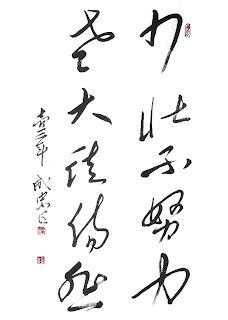Today on the Skritter blog I’m proud to introduce the first entry in the Culture Corner series. Culture Corner was inspired in a large part by an ongoing conversation I’ve been having with Olle over at HackingChinese about devising the best way to learn and use fixed expressions like a native speaker.
Armed with volumes of Tang and Song poetry, tomes of idioms, “400 Quotations for Chinese Classics,” the works of Kongzi, Mengzi, Laozi, and “The Art of War,” this series aims to fill in some gaps to our cultural and linguistic Chinese knowledge. Like Whad’Ya Know?’s “Things You Should Have Learned in School (Had You Been Paying Attention), this is the culture corner, or: Things You Would Already Know (Had You Grown Up Speaking Chinese).
First up in the series is one of my all time favorite idiomatic phrases:
(S) 少壮不努力,老大徒伤悲
(T) 少壯不努力,老大徒傷悲
(P) shào zhuàng bù nŭ lì, lǎo dà tú shāng bēi
(E) If one does not exert oneself in youth, one will regret in old age; It will be too late to bewail in time wasted in one’s youth.
Originally written by Guo Mao Qian (郭茂倩) in the lyrical poem《长歌行》/《長歌行》(cháng gē xíng), this idiomatic phrase is the prefect weapon of encouragement for anyone who might appear to be wasting their youth away (or just not getting out of bed one day). I first encountered this poem while living in Beijing, and have used these words as a source of personal encouragement every day since. It also ties so well with the cram school and test school culture, capturing the work-hard mentality associated with Chinese in general. Uttered by parents, schools, and government officials alike, it is hard for young people to argue against this ancient poem’s message: “work hard now, or regret it forever!”
While this line seems to hinge around “努力”(nǔlì: making great effort), the poem as a whole reflects upon about the fleeting and precious nature of time. Even more important than making great effort, this is a call to action–don’t wait until tomorrow, start doing something today!
Have you heard this phrase before? If so, please share your tale in the comments below.
Resources and supplemental reading (in Chinese):
Full poem with Pīnyīn
Poem with modern day Chinese translation
小学生必背古诗歌:长歌行 (advanced reading)
没有玩耍就没有成长 (advanced reading)

